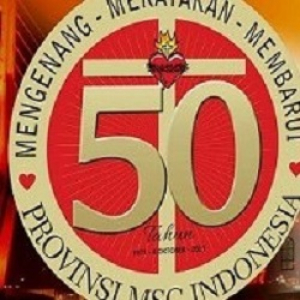Peter MALONE
Tales of Tomorrow
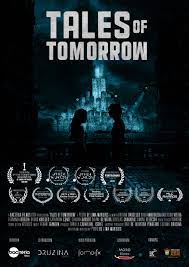
TALES OF TOMORROW
Brazil, 2020, 85 minutes, Colour.
Bruno Barcelos, Duda Andreazza, Bruno Krieger.
Directed by Pedro de Lima Marques.
Science fiction from Brazil, principally for a younger audience, familiar with computer technology, and science fiction scenarios.
Some of the action takes place in 1999, a young man, clever, but insolent at school, friends at school including his girlfriend, getting programs illustrating the future. The rest of the action takes place hundred and 50 years later, post-apocalyptic, remnant humans building skyscrapers for surviving cities.
However, there is mystique about the future, various groupings, a mysterious ghost character, Zero, and threats to the core of the future city.
In fact, as fans might guess, the young student is at the centre of things, going into the future, discovering the truth about himself – as well is the threats of the villain in the future (his teacher at school).
Brief running time but the film is high on CGI and technology, with enough science-fantasy ingredients.
- Post-apocalyptic narrative? The distant future? 1999? Interaction between past and present?
- Brazilian film, imagination, Porto Allegro setting? The present, homes, school? The future, a future metropolis, storms, high-rise buildings, enclosed, interiors? Technology, Internet, disks and downloads? The musical score?
- The opening, the presentation of the future, the storms, the collapse of cities, rebuilding? The abduction of the young woman? Her presence, reappearing, the challenge to Jefferson?
- 1999, Jefferson, intelligent, not responding to class, the teacher and his attack? The classes on anarchism? The friendship with Beatriz? The girl organising the union meeting? His friends? At home, the downloads, the futuristic scenario?
- The development of the future, the situation in 2165, the various factions, young people, anarchy, order? The role of The Core? Control? The role of zero, control of the core? The young people in action?
- The abduction of Beatrice, Jefferson and his reaction, the police interrogation, his mother?
- Jefferson, the warnings, the scenarios, the disks? Is moving into the future, on the beach, the appearance of the young woman, her explanation of the situation, past and future, the discussions about The Ghost? Seeking him? The revelation that Jefferson was The Ghost?
- Jefferson, in the city, in the water, drowning, seeing Beatrice? And the encounter with the teacher? The gun to Beatrice? The discussions about The Call, The Ghost, the threats to the Teacher, is being held by the group? His shooting Beatrice?
- The complications of the final confrontations, the role of Beatrice, dying? The young woman? Jefferson, becoming the centre of the narrative, his becoming a hero? The saviour?
Riders of Justice
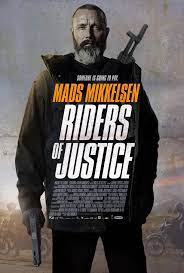
RIDERS OF JUSTICE
Denmark, 2021, 115 minutes, Colour.
Mads Mikkelson, Nikolaj Lie Kaas, Lars Brygmann, Nicolas Bro, Andrea Heick Gadeborg.
Directed by Anders Thomas Jensen.
Riders of Justice is quite an experience. No, that is something of an understatement. In its way, it is quite exhilarating. But, of course there are cautions.
The credits say that the screenplay, by the director. Anders Thomas Jensen and his associate, Nikolaj Arcel (himself a prolific writer and director) is attributed to “After an idea of…”. It would have been most interesting to be a fly on the wall as the two kept on getting more and more ideas, tossing them, tangling them, seeing how far they could go. In fact, if there were to be an award for screenplay which was completely unpredictable from moment to moment, sequence to sequence, Riders of Justice would be a top contender.
It might be possible to write a synopsis of the film, though that would be a challenge, but very difficult to communicate (and the same goes for a reviewer) the changes of mood, the eccentricities of the characters, the funny repartee, the eruptions of violence. It probably should be mentioned that one of the main characters has continual Tourette’s outbursts, no holds barred, and his syndrome seems to be infectious for most of the other characters. They do look graphic up there in the subtitles rather than simply hearing them. And, there are some shootouts and shoot ups (with the continual challenge as to whose side we are on).
The introduction to the characters is arresting, Mathilde, a young girl, wanting a bicycle for Christmas; her military father phoning to say he cannot return for three months; a boardroom meeting with two eccentric characters who are putting a proposal about using statistics for predictions – they are fired! But, mother and daughter and one of the eccentrics find themselves together on a train, an explosion, the mother killed. And the statistician noting the suspicious behaviour of a passenger, going to the police with this information, but not really believed. Actually, looking at the characters and listening to them, who would believe that? But, each of them in his own way is quite obsessive, caught up in theory, but also one of them being an absolute expert in hacking, and their having another friend whose life is absorbed by hacking, collating information, extraordinary resources – so that the three are able to identify the suspicious man on the train.
In the meantime, the military man comes home, tries to relate to his daughter, failing. She is also interest in the chain of events, the unpredictable happenings that led to the tragedy, a series of post-its on her bedroom wall. Later in the film, the statistician and Mathilde will have a long conversation about the nature of events, happenings, coincidences, the various strands of life that lead to an event in the human mind unable to comprehend it all.
If this sounds intriguing, then the film itself and the development of the screenplay are much, much more intriguing. The three experts, looking and acting like a variation on the Three Stooges, team up with the military man, identifying the criminals, a man on the train with his lawyer, about to testify against the bikie gang, Riders of Justice. It all seems logical, given the technology, and the three move into the military man’s barn, a huge headquarters to probe the case. Actually, the plan keeps going skewiff, including deaths, shooting, the rescuing of a male escort from Ukraine who ends up doing the equivalent of au pair work with the daughter. Also in the act is her boyfriend, a smart cook whose recipes appear online – which ultimately has dangerous consequences.
Some mention should be made of grief, therapy, counselling, one of the eccentrics having to take over as a therapist (with the mention that in his own life he had had several thousand hours of therapy so knew what he was doing) – and some of the sessions both effective and funny.
Not sure whether this review is doing justice to Riders of Justice, but it is an experience of deadly serious episodes combined with ironic farce, shudder one moment, smile and laugh the next. And, the final shootout could be in serious competition with The Wild Bunch. But, at the end, some smiles, but it is Christmas, each receiving a gift, a French horn rendering of The Drummer Boy, Mathilde on her bike in the snow, and some tears forming in the eyes of the audience.
The cast is excellent. Mads Mikkelson as the soldier, his frequent collaborator, Nicolas Bro, comically capitalising on how large he is, as the computer expert, and a word for Andrea Heick Gadeborg as Mathilde, holding her own well with the adults.
- The impact of the film? Serious? Comic? Clever?
- Scandinavian filmmaking, reputation, directors and writers, actors, national appeal, international appeal?
- The city settings, the countryside, the farm and the barn, the city, the clubs and haunts?
- The intricacies of the screenplay, introduction to characters, so varied, bringing them together, interactions, leads, developments? The issues of fate, chance, coincidence, statistics? Pondering the mystery of events in the various strands leading to particular events?
- Mathilde, her grandfather, the red bike, the blue bike, the gift, her riding, the bike being stolen? Contact with her mother, riding in the car, having to take the train? Her father, soldier, the phone call, having to stay three months? The mother, her reaction, mother and daughter taking the day off, the car, breakdown, on the train?
- The introduction to the statisticians, the board meeting, their eccentricities, obsessions, complex explanations, failures, being fired?
- Otto, in the train, observing, Mathilde and her mother, Otto offering the seat, the men leaving the train and disposing of his lunch, the explosion, injuries, the mother’s death? Hospital, Mathilde and the trauma, Otto and his sympathy, the father returning from his post?
- The consequences for father and daughter, tensions, the need for therapy, the father and his tough military stances? The daughter, emotional, upset about being non-emotional? The clashes at home, her wanting to go to school? Her friendship with Sirius, his ability with cooking?
- Otto, the discussions with Lennart, identifying the man on the train, the possibility of his being in Cairo, the alternate connection, going to the police, not being listened to? The decision to go to M and father, his obsessions, Tourette’s Syndrome, skills, computers, clashes with his friends? Further identification?
- Otto going to Marcus? Explanations, plausibility, going to work in the barn? Marcus and his military background, decisions, identification of the man on the train, the witness on the train with his lawyer, about to give evidence, the Riders of Justice, the brother leader?
- The initial expedition, going to the house, the confrontation with the man, Marcus and his anger, killing the men, Lennart discovering the escort boy? The reactions, police investigation, cover?
- The further developments, the investigations, M and father and the barn, his work, tantrums? His wanting military training, the group going shooting, putting the guns together? Eventually going out, M and father and his failure, unable to shoot?
- Mathilde, a puzzle about the men in the barn, needing therapy, Lennart stepping in, improvising, the story that he had thousands of hours in therapy, his methods, having the language, shrewd, skills, Mathilde’s response? Sirius and his parents as psychologists, his having the language and jargon?
- Marcus, in the car, Otto upset, his being thrown out, going to the club, the stakeout, the shootings, some deaths by mistake, rescuing the escort, taking him home, the Ukrainian background, his own pair work, settling in, helping with the cooking, cleaning the house? And picking up Otto from the road?
- The gang, their violence, going on the rampage? Going to the barn?
- The strategies, the stakeout, Marcus and his military tactics, the eventual confrontation, the whole household lined up in front of the house, shooting the attackers? Marcus wounded?
- Christmas, everybody safe, the happy household, Mathilde and her riding her bike, the gifts, M and file and the French horn, playing The Little Drummer Boy?
Brawler, The

THE BRAWLER
US, 2018, 95 minutes, Colour.
Zach McGowan, Amy Smart, Taryn Manning, Joe Pantoliano, Burt Young, Jason James Richter, Nick Loeb, Anthony Mangano, Jerrod Page.
Directed by Ken Kushner.
This is the story of boxer, Chuck Wepner. He has to be one of the least attractive subjects for a feature film, ambitious yet erratic, potential yet self-indulgent and ruining his life. Another film was made about him, two years earlier than this film, Chuck, The Bleeder (his nickname). It had a very strong cast with Lee Schreiber in the central role, and an upmarket supporting cast including Naomi Watts, Elizabeth Moss, Ron Perlman, Jim Gavigan and Michael Rappaport. It was directed by Philippe director of Monsieur Lazar and My Salinger Year. It would be the preferred version to watch.
Zach McGowan plays Wepner, showing his physical strength but also his self destructiveness. The film does sketch in some background of his growing up in New Jersey, fighting, his aggression and joining the Marines, leaving the Marines and working as a security tough for Mafia bosses, going back to boxing, his being caught up in professional boxing with his coach, and interventions from entrepreneur, Don King. He is set up to have about with Mohammed Ali (who mocks Wepner, especially in a press conference). Wepner, surprisingly, goes the time with Ali – which leads to the inspiration for Sylvester look Stallone and the character of Rocky.
The film shows Wepner’s family life, his womanising, estrangement from his wife, Phyllis. He is praised by Stallone, referring to him as the inspiration for Rocky. Wepner attends an audition, at Stallone’s request, for a role in Rocky 2 to but is aggressive towards the producer. With his reputation and popularity because of his boxing and the bout with Ali, as Well Is Rocky, Wepner goes down the rocky road of fame, wealth, drinking, womanising, and cocaine. He is eventually arrested with cocaine with intent to sell. He spends two years in prison. The earlier film does not take up the scam that Wepner was involved in, fake signing of sports memorabilia. The film shows sympathy from Linda who becomes his second wife, believing in him even during his prison years. However, not in the previous film, she comes up with the idea of suing Stallone for exploiting Wepner’s reputation. There are vigorous interchanges between lawyers, Stallone and Wepner – with his ultimately winning his case and the final glimpse of Wepner and Linda living in luxury.
Not particularly well-written or acted, the film gives something of the background of the character, his situations – and his unlikeability.
Mob Town
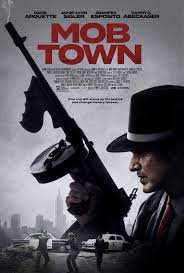
MOB TOWN
US, 2019, 88 minutes, Colour.
David Arquette, Danny A. Abeckaser, PJ Byrne, Jamie-Lynn Sigler, Jennifer Esposito, Gino Cafarelli, Robert Davi.
Directed by Danny A. Abeckaser.
The event portrayed in this brief film is significant in the history of the Mafia and the role of the FBI and the American government. It focuses on the deaths of Mafia chiefs in the mid-1950s, the predominance of Vito Genovese the, the idea of summoning many of the Mafia heads to a gathering in upstate New York, the town of Appalachin. Genovese is portrayed by Robert Davi.
The film is brief and must have had a small budget – especially evident in the quick resolution of the meeting, the role of the police and the FBI, the Mafia chiefs scattering through the woods, driving off, held up by roadblocks but shown in only a minute or two.
The emphasis is on Ed Croswell, a police officer who had been involved in cases in 1942 but fallen foul of authorities are not promoted. Here he is played by David Arquette. The film shows his earnestness, his suspicions of the Mafia, his pulling up a Mafia driver who is quickly released from custody by a New York judge’s warrant. He becomes suspicious of one of the Mafia types in the town, Joseph Barbara (played by the film’s director, Danny Aberkaser. The film shows his perseverance, his chief not initially believing him, his less than competent partner who goes to sleep on the job, his stakeouts, discovering what was going on, especially when food in the town is being brought up by Barbara. He is actually seen by one of the Mafia wives as he jots down the numberplates of the cars outside the house – which leads to the group fleeing.
There is a subplot of a romance with the local widow of a former policeman. And, at the end, there is a phone call from the president praising him for his intervention and what it led to. There is a lot of final information about the group the gathering, arrests, charges, and the overturning of verdicts. However, it shows Ed Croswell’s later career and the significance of this event and the confrontation of government and Mafia.
Daybreak/ 1993
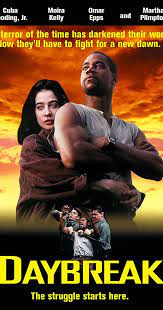
DAYBREAK
US, 1993, 91 minutes, Colour.
Moira Kelly, Cuba Gooding Jr, Martha Plimpton, Omar Epps, Amir Williams, David Eigenberg, Alice Drummond, John Cameron Mitchell, John Savage, Mark Boone Jr, John Seda.
Directed by Steven Tolkin.
Daybreak is one of the substantial collection of HBO movies for release in cinemas and for television made during the 1990s and into the 2000s.
This film is based on a one act play by Alan Bowne, Beirut, set in New York City and filmed in Washington Heights, 158 Street. The screenplay is considerably opened out.
The context is an epidemic, a disease sexually transmitted, frowned on by society. The play and the film were set in the context of the emergence of AIDS in the 1980s and continuing attitudes in the 1990s. The public is wary of the disease. Those infected are taken into quarantining which is virtually a prison experience, anyone attempting to escape being shot. In the meantime, there are various television clips with the president of the United States (John Savage) speaking patriotically and with the political face of care for the public.
The film shows the special squads which do the policing, the roundups, and exercise violence.
On the other hand, there are the ordinary workers, two young women played by Moira Kelly and Martha Plimpton, Blue and Laurie. Blue accompanies Laurie to get tested for the disease but they are warned off by a young boy and they decide against the test, tearing off the register page with their names, being pursued into the slums but rescued by a mysterious man, Torch, Cuba Gooding Jr.
Daybreak can be seen as a story about the resistance, rescue missions for patients, hiding them and helping them, especially in their dying. This is dangerous work, the special squad investigating and pursuing. Blue decides to return to the area where they were rescued, encounters Torch and becomes involved with the action, much of it dangerous. Torch is standoffish but gradually the relationship develops. The young boy is the son of a woman Torch was involved in but who has died.
The screenplay does not develop in quite the way anticipated. Laurie is concerned about Blue and asks questions which lead to the police squad taking over one of the rebels’ missions, pursuit, Torch being taken, discovered to be positive and interned in quarantine where he is tortured and imprisoned?
Blue decides to go into the quarantine to be with Torch, aided by her squad brother, smuggled in – reunion with Blue wanting to stay, Torch wanting her to leave. There are some graphic moments with a leering guard and lascivious behaviour, humiliating Blue. Torch persuades her to be smuggled out again and to be a leader with the rebels.
Included in the cast are Alice Drummond, memorable from Awakenings, here in her 60s (and continuing on films until she died aged 88), and John Cameron Mitchell, prolific and acting until he made headlines with his play Hedwig and the Angry Inch.
- The title? The climax and the decisions?
- The screenplay based on a one act play, called Beirut, set in New York City in play times? The opening out of the action?
- The context of the epidemic, the context of AIDS, the memories of the outbreak and spread of the 1980s, into the 1990s? Public reaction? Fears? Sexually transmitted illness? Caution, quarantine? But the fascist overtones of the quarantine, the ill-treatment of the patients, escapes and shootings, interrogations and torture?
- The initial settings, the woman attempting escape, pursued by the squad, the shooting? The squads, policing, controlling, violence? Ideology? Hunter and Bucky as part of the force?
- The television sequences, the President, his speeches, saving the people, action, seeming sympathy, yet behind the scenes?
- Blue, her work, will with Laurie? At home, the sick mother? Her relationship with Bucky? Laurie and her wondering about her health, going to the test, Willie and his notes warning against this? The mother and the outbreak in the centre, wanting to see her son, her being held back? Blue and Laurie and their apprehension, stealing the page? The pursuit, hiding, encountering Willie, encountering Torch, his drawing the pursuers off?
- Blue, dissatisfied, going to search for the centre, finding it cleared? Willie, taking her to the abandoned mansion, encounters with Torch, his initial hostility? The blossoming of the relationship?
- Blue, becoming involved with the resistance, the various members, Torch and his leadership? Hijacking the vehicles, saving the patients, hiding them, tending to them? The dangers, the pursuits, the episode with the ladder, Blue and her fears, Torch controlling her, saving? Blue continuing with the work, the mellowing with blue, the sexual relationship?
- At home, Bucky and his suspicions? The discussions with Laurie, confiding in Laurie? Laurie giving the information, leading to the police pursuit? Blue and her encounter with Laurie and giving up on her?
- Willie, the story of his mother, the relationship with Torch, sad aspects? Willie, the work for the rebels, his skill as a lookout?
- The plan for the evening, Blue going to help, the truck opening, full of the squad, Blue and Torch shutting the door, the escape? Torch and his being apprehended?
- Bucky, helping Blue, smuggling her into the quarantine centre, the false note to say that she was a patient?
- Torch, interrogated, tortured, tested, positive?
- Anna, her age, part of the resistance, yet her cover officially, helping Torch when he was tortured?
- Blue coming into the centre, the encounter with Torch, her wanting to stay, his wanting her to go? The guard, the lascivious behaviour, Blue humiliated? Torch explaining that she should live on and continue the work? The farewell?
- Blue, coming out, with Bucky, Anna, the rebels – and her leading them to future action?
Boiling Point/ 2021
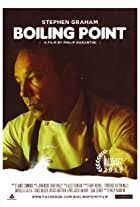
BOILING POINT
UK, 2021, 93 minutes, Colour.
Stephen Graham, Vinette Robinson, Jason Flemyng, Alice Feetham, Hannah Walters, Malachi Kirby, Izuka Hoyle, Taz Skylar, Lauryn Ajufo, Ray Panthaki, Lurdes Fabares, Daniel Larkai, Robbie O'Neill, Aine Rose Daly.
Directed by Philip Barantini.
Boiling Point is quite a film! A brief synopsis would not make it stand out: an night at an outer London restaurant, staff and their work, diners. In fact, that is what it is about, but the synopsis does not indicate what impact this will all make. With the title, Boiling Point, there is something of an indication of tension, frustrations and anger. (Alternate titles might include Kitchen Tenterhooks, Desperation behind the Menu, Continually Frazzled Nerves!)
There is a mysterious opening, a man hurrying through the streets, his mobile phone, arriving at the restaurant – and the audience discovering that this is Andy, owner of the restaurant, the chef. We see that he is played by Stephen Graham, stalwart of British drama, a presence in Scorsese films, more recently in British television miniseries.
The film is directed and co-written by Philip Barentini, an actor who has moved to film direction, here employing the single take technique for immediacy and continuity. The audience moves very quickly into the life of the restaurant, the activities in the kitchen, the busyness with the diners.
There is continual activity throughout the film, from the initial sequences where an inspector is looking at the work of each of the kitchen staff, challenging Andy on his bookkeeping, demoting the status of the restaurant to three from five – but indicating that there could be a recovery. And then it is in the kitchen, some of the staff already at work, others arriving late, Andy having to deal with a whole range of personalities and touches of temperament. And, the staff is quite multi-racial (something which will emerge from bigoted diners).
As the kitchen staff move into a faster pace, Andy at the counter with his associate, Carly (Vinnette Robinson), a very sympathetic character in her valiant efforts to keep everything on track, losing her cool with the floor manager, an extraordinary emotional outburst. The various other personalities, whom we get to know very quickly and personally, the skill of the writing as well as some effective dramatic improvising, Tony with the oysters, Freeman cooking the meat (a touch of the prima donna especially when lamb is returned and he explains how lamb should be cooked), the French Camille who does not understand Andy’s accent so well, the pastry cook and her associate, the exasperated woman who does the washing up and her rather laid-back assistant who turns up late. We also get to know some of the front of house characters, though not so well with detail, mainly Emily who runs things in a bossy way and who is the target of Carly’s outburst, and the waitresses, Andrea who suffers the racial taunts, Robyn, free and easy who is late because she has gone to an acting audition.
And, there are successful vignettes with the diners, the bigoted father buying expensive wine and dominating his family as well as racially targeting Andrea, the young man whose girlfriend has a nuts allergy and who suffers a dramatic turn at the end of the meal, a group of girls who flirt with the waiter, some young men who want instagram photos. And, there is the television restaurant critic, Jason Flemyng, with an elegant fellow-reviewer. And we discover he has more interest in the restaurant itself than reviewing, putting financial pressure on Andy.
And all this happens in 90 minutes. Drama and tension, well delineated characters, effective small glimpses of work in the kitchen, of the diners.
At the end, it all has quite an effect on Andy as it does on us. Arresting British filmmaking.
- The title? Angers and frustration? The kitchen and cooking?
- The atmosphere, kitchen tenterhooks, desperation behind the menu, frazzled temperaments and clashes? Audience empathy with particular characters, situations, sharing angers and frustrations?
- The action taking place over one evening? The camera work, single shot, pacing, realism?
- The Dalston setting, outer London? The introduction to Andy, pacing the streets, in a hurry, phone calls, frequently saying he was sorry? His arriving at the restaurant, the discovery that he was the chef, the owner, responsible?
- One night at the restaurant, those working in the kitchen, for those waiting and serving, for the range of guests for the meals? Establishing the characters and their activities, relationships? The brief vignettes building up a picture of life in the restaurant, the guests, the waiters playing to the guests, clashes with the guests? And the reviewers of the meals and the restaurant? The initial sequences with the supervisor, going to each of the kitchen staff, his comments on their behaviour, methods? Sitting down with Andy, looking at the books, dissatisfaction with the information kept? The status of the restaurant moving from five down to three? Possibilities for recovering the status?
- The kitchen, Andy in charge, but emotional bursts, his demands on the members of the staff, criticisms, apologies? The need to phone home, wife, son, apologies? His own particular skills, at the bench with Carly, partnership, relying on her, the particular skills, preparing the plates? With each of the staff, Freeman and his cooking, angry, the meats, the meal being sent back? Camille and washing her hands? Friend and Italy with accents? Tony and the oysters? The cooks with the sweets? The boy and the slashes on his arms? The motherly cook and embrace? Advice for the sweets, tasting? His continued drinking – and the later cocaine and alcohol?
- Alastair Skye and Sarah, reviewing, television, reputations? Their conversations, discussions of the food? Skye, scruffy appearance, friendship with Andy, Andy coming to sit with them, the discussions, the revelation about the £200,000, Skye’s need, and his inability to pay?
- Emily in charge, demands on everyone, her manner, the blow up with Carly, blunt truths told, emotional effect, her going to the bathroom, recovering? Her ability with the guests, with the men wanting instant photos? Her relationship with Andy?
- Robin, arriving late, discussions with Andrea, auditions, at the table with the family, chatting with the others? The men at the bar, manner, camp style, playing to the guests – especially with the flirting women?
- The family, the father in charge, expensive wine, Andrea bringing the wine, the racist attitudes, her return with the meat, his complaint, his attack and not wanting her to touch?
- The genial young man, his girlfriend, allergy to nuts, enjoying the meal, her turn, helping, the ambulance, Andy coping, Skye and his presence, the review of the incident in the kitchen, Camille and her realising what she had done, upset?
- The men with the instagram photos, wanting Andrea to be in the photos, her reluctance? Emily resolving the situation?
- The woman doing the washing up, exasperation, the helper, arriving late, easy-going, the drugs, with the staff?
- The growing tension, people being frazzled (and the audience as well)? Coping with the number of diners, managing the difficulties? How lamb should be cooked!?
- The evening ending, the impact of the allergy turn, the effect on Andy, the pressure from Skye, the discussions with Carly, her exasperation, feeling she couldn’t go on?
- Andy going to his office, the cocaine, the drinking, the phone calls? Throwing away the cocaine, pouring out the alcohol? His going out, his collapse?
- And audience speculation about the future?
My Father and Me
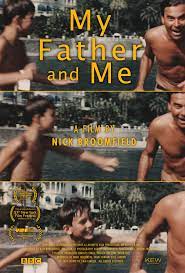
MY FATHER AND ME
UK, 2019, 97 minutes, Colour.
Directed by Nick Broomfield.
Nick Broomfield began making documentaries in 1971. He has had a distinguished career for half a century, taking on a wide variety of projects, international settings, social justice issues, portraits of significant characters, questioning. And, often he has been a strong presence in his films.
While there are sequences from some of his films in this documentary, especially his early collaborations on justice issues with his then-wife Joan Churchill, the main sequences are from his documentary on serial killer, Aileen Wuernos, and his film on Kurt Cobain and Courtney Love, especially the ending where he wanted to speak out and was escorted from the rostrum of a meeting of the American civil rights union.
However, as the title indicates, this is the story of his father, Maurice Broomfield, and his relationship with his father who died at the age of 94.
Maurice Broomfield was an extraordinary photographer, still photographs. His area, especially with the revival of British industry after World War II, was in photographing workers, plant, constructions, inventions. The photographs are extraordinarily striking – compositions, lighting… and this film is something of a heaven for photographers! We are shown many of the photographs throughout the film. Later in his life, he moved away from photography and his photos were stored away. Fortunately, there was a revival of interest, the cataloguing of his photos, and, in his older age, a series of exhibitions and lecture tours. They are certainly part of the heritage of Britain in the 20th century.
Nick Broomfield says that he didn’t have the precision of his father, much preferred making films, the continuity, narrative, perspectives.
The film fills in interesting background to the family, especially the origins in Derbyshire, Derby as the centre of industrial development, especially with Rolls-Royce, and other factories. Maurice married Sonia, a Jewish refugee after World War II. There is quite some comment throughout the film about Maurice’s mother, Daisy, xenophobic and very suspicious of Sonia, the consequence of which was that Nick did not know his grandparents until later in life, especially with Daisy coming to stay in her old age. But, it is a reminder of British attitudes and the English Channel being a barrier preserving England.
There is a great deal of personal story in this film, many home movies, photos, Nick with his sister and their parents. But, his father did not entirely approve of Nick’s vocation to cinema. And this was complicated by Maurice’s more traditional values and perspectives compared with the rather more left-wing views of his refugee wife. Nick explains that he was more in contact with his mother concerning his work and his views.
Nick is interviewed for the film by his former wife and collaborator interaction, Joan Churchill, interesting perspectives and memories about that time.
After the death of Sonia, Maurice seemed to close down. But, he encountered a woman at an art class, after having taken up painting, Suzy, and there was a bond, his companion for the last years of his life, travelling together, a new range of photos…
There is also a series of photos of Maurice with his son on one side and his grandson, Barney, on the other, over a period of years.
Of interest for fans of documentary biography, for those who admire the films of Nick Broomfield, for lovers of photography, and a British portrait from the 20th century.
Lasciami Andare/ You Came Back
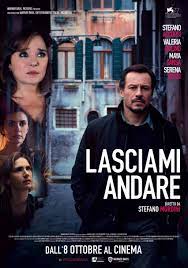
LASCIAMI ANDARE/ YOU CAME BACK
Italy, 2020, 98 minutes, Colour.
Stefano Accorsi, Valeria Golina, Maya Sansa, Serena Rossi, Antonio Truppo, Lino Musella.
Directed by Stefano Mordini.
For audiences who have happy memories of Venice, this is a strong reason for seeing this film. Throughout the drama, there are wonderful views of the canals, the buildings, San Marco underwater, travelling on the canals…
On the one hand, there is a realism thread throughout the drama, the opening with a couple and their young child, buying a house in Venice, establishing themselves. Then the action moves on eight years, indicating the accidental death of the young boy and the consequences for each of the parents. The father, Marco, deeply upset, blaming himself, married again, his wife expecting a child. On the other hand, the mother, Clara, has been deeply affected emotionally, has moved to a new relationship but is brittle. Marco is a successful engineer, visiting his building sites. And he consults his father, an academic.
On the other hand, there is a mysterious thread throughout the drama, introduced by a divorcee, Perla, who pursues Marco to tell him that they have bought the old house, that her son encounters the spirit of his son, is disturbed. There has been a suggestion initially, with the estate agent highlighting the light from the canals reflected on a white wall of a room, beauty, but ghostly. Marco also discusses issues with his father who is an expert on Eastern philosophies, life and continuity of life, life after death.
Perla continues to approach Marco, also goes to his wife, indicating that she would like to sell the house and that they might like to buy it back again.
Again, on the realistic level, Marco is angry with Perla, investigates her, finds he has a dubious financial background, fraud accusations, not to be trusted. On the mysterious level, Clara persuades him to consult a psychic who has a reputation for putting parents in touch with dead children. The psychic seems to succeed but Marco breaks it off.
For sceptics, there seem to be quite rational explanations as to what has gone on, reality, harsh feelings of blame and sorrow, consequences. For those who appreciate something beyond the natural, there are indications as the film develops that there might be some truth in the appearances of the little boy in the house.
The strong cast led by Stefano Accorsi is Marco with international star, Valeria Golina as Perla.
- The Italian title, Let Me Go? The English title, You Came Back?
- Venice, the range of vistas of the city, canals, buildings, high water in San Marco…? The musical score?
- The interiors, homes, different storeys, staircases? Offices? Building sites? Atmosphere? The light on the wall, the reflection, the ghostly effect?
- Marco and Clara, finding the house, the baby, building a life? The transition to 8 years later? Information about the death of Leo, the visuals of his fall? Marco and Clara separated? Marco with Anita, the news of her pregnancy? Joy? Marco visiting his father, advice? The meeting with Clara, her being upset, leaving the restaurant? Marco and his work as an engineer, the building site, the workers?
- Marco and the encounter with Perla, her story, occupying the building, her son, the story of his encountering Leo, upset, the details of the story? Marco, leaving, her pursuing him, thinking of selling the building? Marco and his visit to the estate agent, suspicions about Perla? His googling, her story, the American marriage, divorce, details of fraud? Her fraud in Venice, lies about the building development, Swiss financing? Marco costing her in the restaurant?
- Marco, his relationship with his father, academic, his father and his expertise, Eastern philosophies, life, continuity of life, death?
- Marco, his going to the AA meetings, friendship with Gloria, support? The details about Leo, his suspicions of Gloria, the paid flight to Marrakesh? Her chatting with Perla and giving her the information?
- Marco going to the house with Clara, Perla, her son giving the testimony and explanations? Marco following him, on the ferry, to buy the games for him, expecting the boy to deny everything, the boy saying his mother was upset because of his experiences with Leo?
- The pressure on Marco from Clara, her wanting some sign of Leo? The decision to go to the clairvoyant, the experience, holding hand, is detail about Leo and his death, the bear? Marco leaving?
- Marco and the tensions with Anita, her leaving, the pregnancy tests, his going to visit?
- Marco and his visit to the clairvoyant, the fact that he knew the details, yet his being convinced that he was genuine?
- Marco, with Anita, the birth of their child? Happiness?
- The finale, Marco and the clairvoyant – inconclusive? Clara going into the house, the image of Leo in the light on the wall?
- Ambiguity for believing the rational and the ghostly?
Congratulations, MSC Indonesian Province, 50 Years, October 2021
Congratulations, MSC Indonesian Province, 50 Years, October 2021

In this part of the world, we have our largest province, Indonesia. We have PNG, Australia, Pacific Islands.
On October 6th, 2021, the MSC Indonesian Province celebrated the 50th anniversary of the founding of the province. Before it became an autonomous province, MSC Indonesia was under the Dutch MSC Province. However, after going through various preparations, the MSC General Conference in Rome in October 6th, 1971 erected the MSC Indonesian Province and appointed Fr. P.S. Hardjasoemarta to be the first Provincial Superior.
The Acts of the MSC General Conference, held in Rome from 5 to 15 October 1971, states: “On October 6th, 1971, the General Conference erected the MSC Province of Indonesia. Consequently, Fr Hardjasoemarta is the first provincial superior of the new province.” The preceding text says: “Indonesia has been a Vice-Province, or Provincial Administration since 1961. The special Provincial Chapter held in June 1971 judged that the time had come to ask for the erection of the Indonesian Province. The number of native-born Indonesians has been steadily increasing: 32 priests, 21 brothers, 20 students. Furthermore, there are still many foreign-born MSC working in Indonesia (136). These are free to decide whether they become members of the new Province or remain members of their Province of origin” (Analecta MSC, N. IV, Anno LXIX – 1971, p. 322). Since then, MSC Indonesia has been independent, managing its life and ministry independently, apart from the Dutch Province.

Many events have shaped the MSC Indonesian Province as it is today and towards the future. Therefore, celebrating the 50th foundation anniversary is a historical moment that deserves to be remembered and celebrated – remembering the great works of God experienced in the history of God's People, especially the journey of the MSC Congregation in Indonesia. This 50th foundation anniversary is not only an opportunity for Indonesian MSC to remember and celebrate, but also to renew their being and actions. Therefore, the theme is “Becoming Disciple of the Sacred Heart of Jesus who Remembers, Celebrates, and Renews His Being and Doing.”
In order to make this 50th foundation anniversary meaningful, the Provincial Superior with his Council launched the Jubilee Year in October 6th, 2020. The opening ceremony of the 50th Jubilee began with the celebration of the Eucharist, followed by a short ceremony to mark the start of the Jubilee Year. The launching ceremony took place in the Chapel of the Mother House in Jakarta and was broadcast virtually. In addition, following the launching ceremony, members of the province also marked the opening of the Jubilee Year in every District and Local Communities with different planned activities.
The Provincial Superior with his Council formed a committee in the province, headed by Fr. Florianus Miranta MSC (the vicar) to coordinate various activities to celebrate the 50th Anniversary of the MSC Indonesian Province.

The committee worked to construct the history of the MSC Indonesian Province; to organize materials for reflection on the theme of the jubilee year; to construct a survey questionnaire and to present the results on the “being and doing”; to compose prayers; to prepare liturgies and to deepen understanding of the special prayers of the MSC; to prepare events to celebrate the 50th anniversary of the province ; to produce publications and documentation; to hold social services and to raise funds to support activities of the 50th anniversary of the MSC Indonesia Province. Apart from the Province Committee, local committees were also formed in each District and Local Community.
The journey and growth of the MSC Indonesian Province cannot be separated from cooperation and partnership with the dioceses, institutions, diocesan priests, religious congregations, lay people and other partners. Therefore, this 50th Jubilee celebration is not merely a celebration of MSC but is expected to also involve our partners and all the faithful people. However, due to the Coronavirus pandemic situation, many activities were carried out internally, such as the preparation and publication of a book series on the history of the MSC Indonesian Province; prayers and novenas for the Jubilee Year; webinars on special prayers of MSC; recollection and reflections to deepen the theme of the Jubilee Year in the District and Local Communities; webinars on the theme “communio, missio, leadership and the future”. The committee has been preparing a memorial book and a ceremony for the 50th Anniversary of the Province. In addition to the activities coordinated by the Committee in the Province, each District and Local Community also carried out various activities to celebrate the Jubilee Year according to their context.

Thus, as a Province that is growing and developing, and remembering the historical milestones that have formed the province, together with the Blessed Virgin Mary, Our Lady of the Sacred Heart, all members of the MSC Indonesian Province exclaim: “My soul magnifies the Lord……. For the Mighty One has done great things for us” (Luke 1:49). Let us gratefully remember this historical moment: “May the Sacred Heart of Jesus be everywhere loved!” (Ametur ubique terrarum Cor Jesu Sacratissimum).
| Yoseph Harbelubun , MSC
(Province of Indonesia)

Blind

BLIND
US, 2016, 98 minutes, Colour.
Alec Baldwin, Demi Moore, Dylan McDermott, Eden Epstein, Viva Bianca, Steven Prescott.
Directed by Michael Mailer.
Certainly a blunt title. One of the central characters is, in fact, blind, Bill (Alec Baldwin), a novelist involved in a car accident, the death of his wife and losing his sight.
The other central character is Suzanne, played by Demi Moore, the wife of an aggressive businessman, 19 years of marriage, his manipulating money deals using the family account. His partner is under suspicion from the authorities, arrested, gives testimony against the husband, Mark, a sinister Dylan McDermott. Because of the family account, Suzanne goes before the court and is sentenced to hundred days of community service.
Which is how the two central characters meet, she having to go to the centre for the Blind and read stories to Bill from students in his creative writing course.
And, depending on one’s interests and tastes, whether interested more in the thriller aspects or the dramatic aspects, the film delivers more and less.
On the thriller side, the development is ultimately minimal, some scenes of Mark brutal in prison, freed, aggressive treatment towards an employee whom he pays to spy on his wife. On the romance side, it goes more or less as expected, Bill and Suzanne sparring, mellowing, falling in love, Mark forbidding his wife to see Bill, Bill disappearing but ultimately being found, after the successful publication of his previously unfinished novel, in his favourite spot on the French coast. The ending goes for the full lush romantic treatment.
So, it will depend on interest and tastes.
- The title? Bill Oakland and his blindness, the accident, the consequences, his life and style, his needs?
- Symbolic blindness, Suzanne not seeing the truth about her husband?
- The New York settings, affluent business, homes? College, lectures? The Institute for the Blind, visitors? Bill and his apartment, the streets? And the finale on the Riviera?
- The blend of romance and thriller, with romance winning out, especially the all-stops-out ending?
- The thriller aspects, Mark Dutchman, business interests, socials, deals and pressure, illegal dealings? The encounter with Landry, employing him? The arrest, the charges? His wife’s visits? His behaviour in prison, the big prisoner, the bashing? Engineering his partner’s death by accident? Getting Landry to follow Suzanne? The lawyers, the hearings, no evidence against him, freedom? And the indication of his affair, the note, the revelation about Deanna?
- The romantic aspects: Suzanne, loving her husband, not knowing the truth, suspicions about the family account, his arrest, her reaction, visits, in court, community service? Going to the centre, Ella and her attitudes? Meeting Bill, antagonism, her reading the stories?
- Bill, his novel, the accident, his blindness, the flashbacks to his wife and her death? Teaching creative writing? The stories read to him? His comments, especially to Suzanne about how they should be read with meaning? At home, his manuscript in the drawer unfinished, the untidy house? His blunt manner, Gavin coming to him, challenging him, taking a liking to him, getting Gavin to clean the house, inviting him to come to classes?
- Bill, the growing relationship with Suzanne, the effect on her, resistance? The going for the walk in the park, his memories? The going to the restaurant, going home, the friendly super at the door? The night together, the consequences?
- Landry following Suzanne, her paying him off, Mark threatening him, extracting the information?
- Mark, obsessive with Suzanne, forbidding her to see Bill? Her reaction, the affair and the note, the past with Deanna, the gym together, friendship, Suzanne disillusioned with her?
- Bill, his disappearance, going back to France? Publishing his novel? Suzanne, his disappearance, her walking out on Mark, going to friends and the lush romantic ending?
